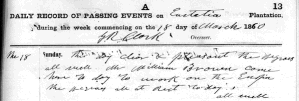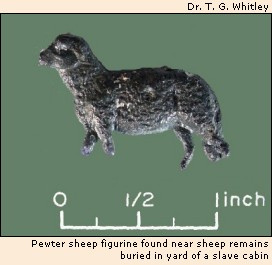from the National Humanities Center |
|
 | |
|
|
| NHC Home |
|
African American Christianity, Pt. I: | |||||||||||||||
|
To the Civil War Laurie Maffly-Kipp University of North Carolina at Chapel Hill ©National Humanities Center |
| ||||||||||||||
(part 3 of 3)
"This day clear & pleasant. The Negroes all well. . . . The Negroes are at Rest to day."
Sunday, 18 March 1860
"This day cloudy & warm. The Negroes all at Rest. I gave the Negroes tobacco to day. 2 sick."
Sunday, 22 April 1860
"Christmas day. All hands had holiday. Gave them three hogs."
Tuesday, 25 Dec. 1860Entries in account book of George Clark, overseer, Eustatia Plantation,
Mississippi, 1860
full text
Historians Debate
Only in recent years have scholars begun to investigate the varieties of African-American religious experience in nineteenth-century America. Slave religion has fared best of all so far, and the logical place to begin is with the extremely accessible and helpful work of Albert Raboteau. His Slave Religion (1978) is still an indispensable survey of the major themes surrounding the mixing of African religions and evangelical religion in the United States. His more recent essays in A Fire in the Bones (1996) also contain useful discussion of free black churches, black Catholicism in America, and a variety of other profitable topics. His work has recently been supplemented and furthered by Sylvia R. Frey and Betty Wood in Come Shouting to Zion: African American Protestantism in the American South and British Caribbean to 1830 (1998). [See Works Cited.]
Evidence of African rituals involving animal sacrifice, Cherry Hill plantation, Georgia, late 1990s moreTwo debates have occupied much of the literature on African-American religions over the last several decades. The first surrounds arguments about the extent of African survivals in black Christian traditions: to what extent did over 400 years of forced exile and enslavement eradicate African customs altogether? Raboteau takes up these questions and describes their background, and scholars since the 1970s have pursued it with increased vigor (the most active advocate of African "survivals" has been the historian Mechal Sobel; her works should be consulted for more specific examples). Since the 1970s, abundant evidence has emerged to document the ways in which remnants of African religious systems indeed survived the horrors of slavery.
Archaeologist collecting soil in an 18th-century slave cabin root cellar on a plantation near Jamestown, ca. 1995 Equally prominent has been the question of whether Christianity was, in retrospect, a helpful or harmful ideology for slaves and free blacks. In the early 1970s, scholars bolstered by Marxist philosophy (such as Eugene Genovese, Roll, Jordan, Roll: The World the Slaves Made (1974) and black nationalism (as in Sterling Stuckey, Slave Culture: Nationalist Theory and the Foundations of Black America (1987) argued that Christianity had prevented blacks from doing more to further their own political causes by encouraging submission to authority and passivity in the face of violence. The most sustained rejoinder to this assertion came in Gayraud Wilmore's Black Religion and Black Radicalism (1992), in which Wilmore outlined a longstanding relationship between African-American religious leaders (mostly evangelical) and a commitment to political protest against slavery and inequality.
More recent authors have come to a middle ground on this issue, tending to see the complexities of the role Christianity has played in the experience of American blacks rather than engaging in an "either/or" debate. Most notable in this newer literature (although not appropriate as texts for high school students, they are nonetheless great reads) are Michael A. Gomez, Exchanging our Country Marks: The Transformation of African Identities in the Colonial and Antebellum South (1998), Jon F. Sensbach, A Separate Canaan: The Making of an Afro-Moravian World in North Carolina, 1763-1840 (1998), and James T. Campbell, Songs of Zion: The African Methodist Episcopal Church in the United States and South Africa (1995).
Links to online resources
Works Cited
Illustration Credits
Comments & Questions
Laurie Maffly-Kipp is Associate Professor of American Religious Studies in the Department of Religious Studies of the University of North Carolina at Chapel Hill. She was a Fellow at the National Humanities Center in 1993-94. Dr. Maffly-Kipp is the author of Religion and Society in Frontier California (1990) and her current book project is African-American Communal Narratives: Religion, Race, and Memory in Nineteenth-Century America. Dr. Maffly-Kipp is a consultant to two major documentary projects: African-American Religion: A Documentary History Project, eds. A. J. Raboteau and D. W. Wills, and The Church in the Southern Black Community (1998/99 Award Winner of The Library of Congress/Ameritech National Digital Library Competition). She serves on the editorial boards for Church History and The North Star: A Journal of African-American Religious History.
Address comments or questions to Professor Maffly-Kipp through TeacherServe "Comments and Questions."
TeacherServe Home Page
National Humanities Center Home Page
7 Alexander Drive, P.O. Box 12256
Research Triangle Park, North Carolina 27709
Phone: (919) 549-0661 Fax: (919) 990-8535
Revised: June 2005
nationalhumanitiescenter.org


